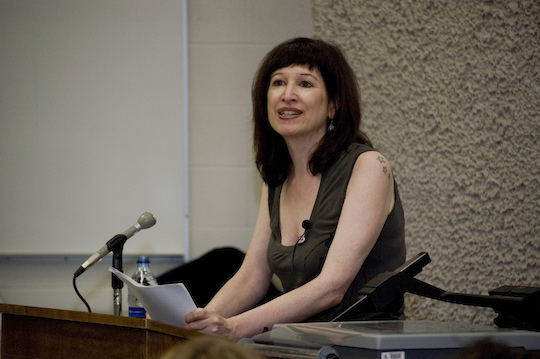Three months ago, Laura Kipnis wrote an essay for the Chronicle of Higher Education called Sexual Paranoia Strikes Academe. In it, she argues that Northwestern’s new policy forbidding professors from dating undergraduates presumes young adults are powerless before the charismatic and institutional powers of teachers—presumes it in a way that encourages students to think of themselves as powerless, too. Quote:
It’s the fiction of the all-powerful professor embedded in the new campus codes that appalls me. And the kowtowing to the fiction—kowtowing wrapped in a vaguely feminist air of rectitude. If this is feminism, it’s feminism hijacked by melodrama. The melodramatic imagination’s obsession with helpless victims and powerful predators is what’s shaping the conversation of the moment, to the detriment of those whose interests are supposedly being protected, namely students. The result? Students’ sense of vulnerability is skyrocketing.
She also describes, in vague terms, recent allegations against fellow Northwestern professor Peter Ludlow. Shortly thereafter, two Northwestern graduate students filed their own Title IX complaints against her, saying the essay constituted “retaliation” and discouraged victims of sexual misconduct from coming forward. A subsequent investigation cleared her of wrongdoing.
So, uh, did a professor just get investigated under Title IX for writing an essay? Maybe. The students who brought the complaint against her seemed more concerned with her commentary on the Ludlow investigation, although they also objected to the essay’s potential effect on the atmosphere at Northwestern.
Probably, it was a bad idea for Kipnis to write about an ongoing, confidential investigation of her colleague. It was also probably also a mistake to present a nuanced idea in such a hyperbolic style. But the fact remains that Kipnis calls on the reader to acknowledge more shades of gray in the relationships between students and professors—to accept that, although many professors are creepy and manipulative, students can be those things, too. They are more than innocents mesmerized by Svengali’s gaze.
Kipnis’s term for this reductive thinking is “melodrama,” and she uses it in the technical sense appropriate to her field. The irony is that her call for more realistic and nuanced thinking about the sexual dynamics between students and professors got her into a Title IX investigation, evidently because it sounded sympathetic to professors, the villains in the melodrama.
But maybe the whole problem was her loose talk about another, ongoing Title IX investigation. At the Washington Post, Erik Wemple reports that most of the questions asked of Kipnis during her hearing centered on the Ludlow investigation, including what her sources were and whether certain sentences referred to that particular complainant. Only at the end did they get to whether her essay might have “a negative impact on sexual harassment reporting.”
The news that the “faculty support person” who accompanied her to hearings was also accused of a Title IX violation is terrifying, until you learn that the complain arose from his speaking publicly about the Kipnis case. Although this story is presented as an abuse of Title IX to enforce orthodoxy, it mostly seems to concern two professors who talked out of their asses about ongoing investigations.
For the record, I think professors should not date students under any circumstances. Your students will understand class differently if they think you are romantically available to people like them, even if you restrict yourself to students from different departments. Also, come on. Once you are old and wise enough to teach college classes, a 20 year-old is a boring date. Yes, college students are inordinately pretty, but a professor, of all people, should understand that there is more to it than that.
But Kipnis is right: the dynamic between professors and students is more balanced—or at least less uniformly imbalanced—than Northwestern’s conduct code acknowledges. When I taught undergraduates, more than one of them tried stuff that I considered inappropriate. Sometimes it was because they were dumb, and sometimes it was because they knew they were attractive and charming. In those moments, I don’t think they felt any more frightened and vulnerable than I did.
The main issue here, though, is that a professor had to submit to a Title IX investigation for writing an essay. I was initially inclined to agree with her faculty support person: that was an egregious abridgment of academic freedom. But the details of the essay and the complaint make that narrative less clear. In presenting her Title IX “inquisition” to the public, Kipnis seems to have indulged in some melodrama of her own.





I read most of her dumb column. What a bunch of over-simplified, narcissistic garbage.
“a 20 year-old is a boring date”
Some 20-year-olds are smarter than me, and also bouncy and pretty, and many of them haven’t yet lost all hope.
Also, I’ve heard that sometimes people just bang without such pretense. So, in sum, that was a pretty silly argument to make against the romancing of undergraduates.